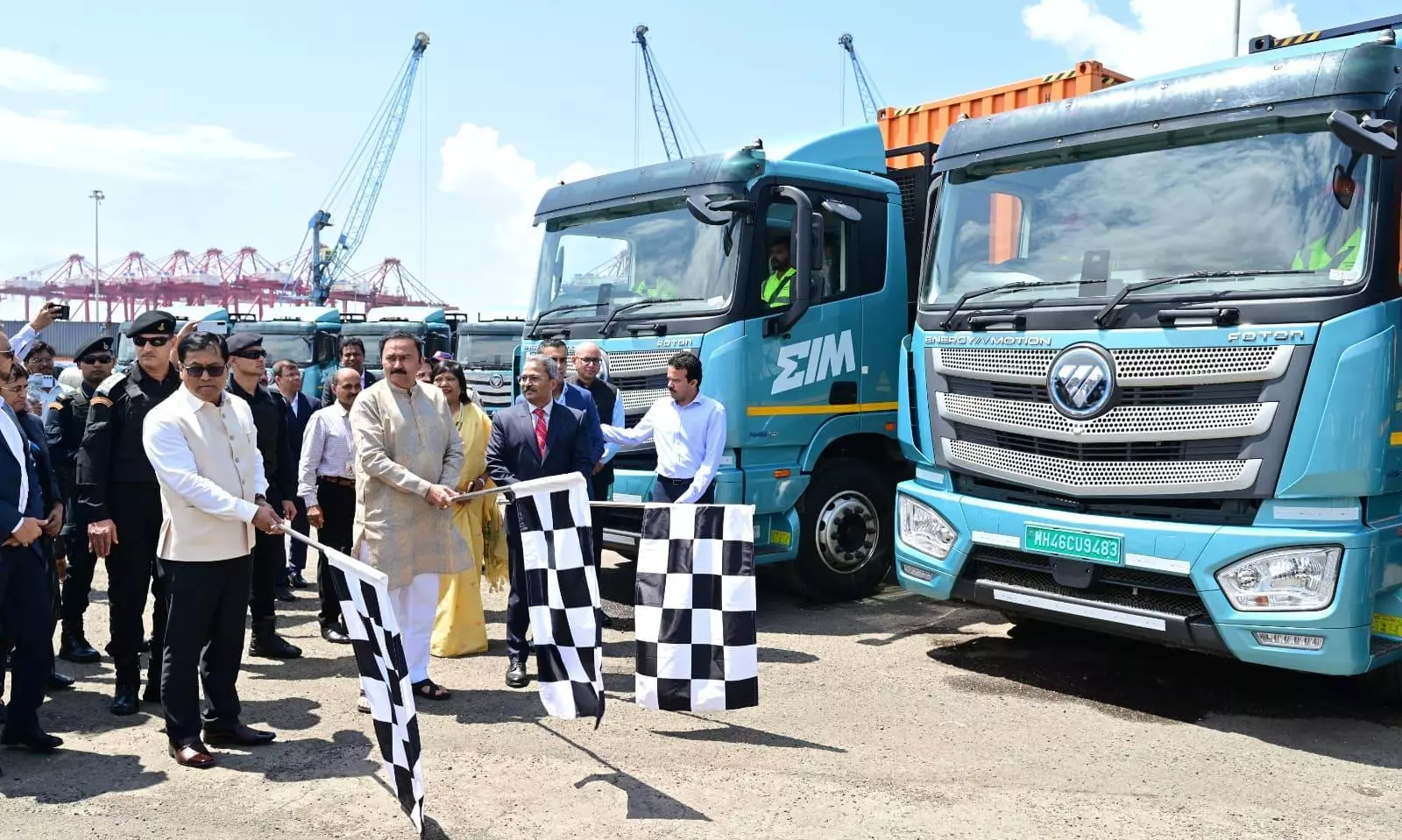JNPA flags off new EV truck fleet to boost green logistics
By adding EV trucks to operations, JNPA aligns with India’s energy transition and its 2070 net-zero commitment.

Jawaharlal Nehru Port Authority (JNPA), India’s biggest container port, held the flagging off ceremony for a new fleet of electric trucks at its Nhava Sheva Distribution Terminal, according to an official release from JNPA.
The introduction of these advanced EV trucks represents a significant step in JNPA’s drive toward decarbonisation and energy transition within the maritime and logistics sector. The move underscores the Authority’s commitment to global sustainability goals while enhancing operational efficiency and lowering the carbon footprint across cargo transport routes.
During the event, an MoU was also signed between JNPA and Isaac Centre for Public Policy (ICPP), Ashoka University, Delhi. This MoU is signed to create the Logistics Cost Index - a reference framework for port authorities to determine tariffs from both cost benchmarking and port benchmarking perspectives, across various cargo types and commodities.
“Today, when JNPA takes a decisive step in electrifying its fleet of logistics vehicles, it sends a message far beyond port boundaries. It sends a message that India’s ports are ready to embrace the future, ready to pioneer practices that will set benchmarks for sustainability, efficiency, and innovation. Across India, ports are introducing solar and wind power projects, LNG and hydrogen fuel infrastructure, and electrification of cargo handling equipment. Step by step, we are ensuring that the Indian maritime sector not only keeps pace with global developments but also sets new benchmarks,” says Sarbananda Sonowal, Union Minister of Ports, Shipping, and Waterways.
“In recent months, JNPA has consistently been in the news for the right reasons, be it ranking among the Top 25 Ports globally in the World Bank’s CPPI index, achieving records in container handling, or advancing key projects in the SEZ, digitalisation, and green energy. Today’s event adds another jewel to that crown of achievements,” he adds.
This initiative holds particular significance as JNPA, which manages nearly half of India’s container trade, sets a benchmark for sustainable logistics on a national scale. The deployment of EV trucks serves as a tangible example of India’s broader logistics transformation under PM Gati Shakti and the National Logistics Policy (NLP). Through the integration of EV trucks in port operations, JNPA is demonstrating its alignment with national energy transition goals, including India’s net-zero target by 2070, supporting the National Electric Mobility Mission Plan (NEMMP) by highlighting commercial-scale EV adoption in high-throughput logistics, reducing operational emissions, particulate pollution, and noise within the port ecosystem, and establishing a replicable model for other major and non-major ports to follow in adopting EVs for cargo handling and last-mile connectivity, the release added.
“The launch of this new fleet of EV trucks represents not merely an incremental enhancement of our logistical arsenal, but a paradigmatic leap towards a cleaner, greener, and more resilient future for port operations. As custodians of India’s largest container port, it is incumbent upon us to embrace innovation that reconciles economic dynamism with ecological responsibility. These EV trucks will serve as harbingers of a new era, wherein sustainability is not an adjunct to growth but its very foundation,” says Unmesh Sharad Wagh, IRS, Chairperson, JNPA, and CMD, VPLL.
The ceremony underscores JNPA’s steadfast commitment to the Government of India’s vision of reducing emissions in the maritime sector, as articulated under the Maritime India Vision 2030 and Green Ports initiative. With this initiative, JNPA continues to pioneer practices that integrate environmental stewardship with operational excellence, thereby reinforcing its position as a trailblazer in the nation’s port-led development.



